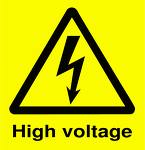
|
POWERING THE FUTURE OF OPEN LEARNING |

|
INTERNATIONAL HIGH VOLTAGE SYMBOL |
Discipline Summary
Electrical engineering is a field of engineering that generally deals with the study and application of electricity, electronics, and electromagnetism. Historically, Electrical Engineering dealt with power generation, transmission, and distribution while Electronics Engineering dealt with smaller electrical devices. Over time, however, Electrical Engineering developed to contain a wide range of sub-fields including electronics, digital computers, power engineering, telecommunications, control systems, radio-frequency engineering, signal processing, instrumentation, and microelectronics.
All of these disciplines share a likeness in the early stages of learning, namely the mathematics, physics, and chemistry required to fully understand and begin the path to becoming an electrical/electronics engineer. After study of these math and science fundamentals has been sufficiently completed, further study can be done within each sub-discipline. Because of the progressive nature of technology and Engineering, there is a lot of overlapping of disciplines between Electrical Engineering and Electronic engineering.
Department vision and mission
Even though the department is not vested to confer degrees or diplomas, it holds dear the right of learning and research. Course content that is developed is rich enough to guide students on the path of becoming an Electrical Engineer. Furthermore, the material is a resource that practicing Electrical Engineers are able to refer to from time to time.